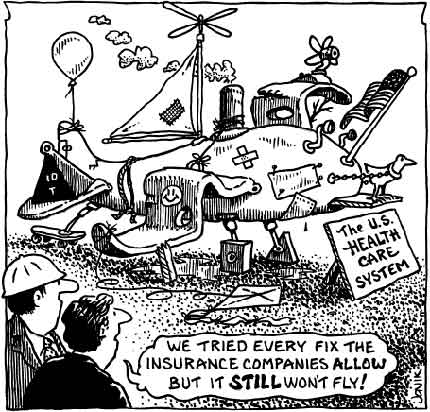|
Cartoons of
Dan McConnell
featuring
Tiny the Worm
Cartoons of
David Logan
The People's Comic
Cartoons of
John Jonik
Inking Truth to Power
|
Support the WA Free Press. Community journalism needs your readership and support. Please subscribe and/or donate.
posted Nov. 6, 2009
cartoon by John Jonik
![]()

A Close Look at the 'Corporate Option'
Ten reasons why mandatory private health insurance is an awful idea
By John Jonik
1) Private insurers are businesses that must grow. This guarantees endless cuts in service, and endless hikes in costs to the public. These companies have both motive and duty to provide as little service as possible at the highest price possible. This is an adversarial situation with the public.
2) A significant chunk of customers’ health care money goes to corporations that give contributions to political candidates that customers may not care to support. These corporations also spend customer money by lobbying for legislation that favors the corporations’ own interests. Mandatory purchase of private insurance would have our government---our sworn and paid representatives---compelling citizens to provide revenues to candidates preferred by private insurers. There is no public interest health-related justification for mandating this part of an insurance policy.
3) A large percent of the cost of a policy goes to non-health-related things such as advertising, CEO bonuses, corporate jets, business conventions, and corporate headquarters upkeep. No health-related justification exists for mandating that citizens pay for that along with the actual health benefits.
4) For-profit insurers, using revenue collected from customers, invest in all sorts of private businesses, many being among the most health-damaging ones, including cigarette manufacturing, pesticides (including many pesticides used in tobacco products), dioxin-producing chlorine industries, genetically engineered crops, and so forth. This creates a conflict of interest in that insurers would be inclined to ignore or play down harms caused by their investment properties. This conflict motivates insurers to blame, as a distraction and PR tactic, every non-industrial thing they can think of for causing diseases.
5) For-profit insurers invest heavily in environmentally destructive industries such as mountaintop removal coal mining, oil, clear-cut logging, and factory fishing. These insurers also invest in sweatshop operations, military contractors, and union-busting firms. Furthermore, these insurers may invest in businesses that compete with a customer’s own livelihood or in businesses which a customer may disapprove of for a variety of moral or religious reasons. A mandate to purchase services from such an insurer would be a compulsion on people to violate their own beliefs or undermine their own well-being.
6) For-profits invest in pharmaceuticals, thus creating a conflict of interest in that such an insurer would use its power to favor drugs from its own investment holdings over others that may be cheaper, more effective, or safer. This conflict would also prompt an insurer to be lax in checking, or warning about, insufficiently tested or harmful drugs. This syndrome virtually guarantees that an insurer would oppose use of natural, un-patented remedies.
7) Mandates to purchase private health insurance are notably different from mandates on car owners to buy auto insurance. One may opt out of that compulsion by simply not driving. But, with health care, those in certain income brackets where “having” insurance is to be mandated will have no option except unacceptable ones---to a) leave the country, b) deplete assets to avoid the obligation, or c) die.
8) Mandates force people to speak to private insurers, an apparent violation of the Fifth Amendment---especially regarding the above-noted parts of the program that have no justification on health care grounds.
9) A person in the income level that will be compelled to purchase private insurance services will be paying private insurers twice: once directly, and a second time via their taxes to subsidize private insurance for low income people. Government will not just pay doctors and hospitals---it will give our tax money to private insurers to do that, at undoubtedly a great cost.
10) When the government subsidizes private insurance for low income people, much of that money will still go to the non-health-related things---including the investments in god-knows-what, and including big campaign contributions to political candidates.


